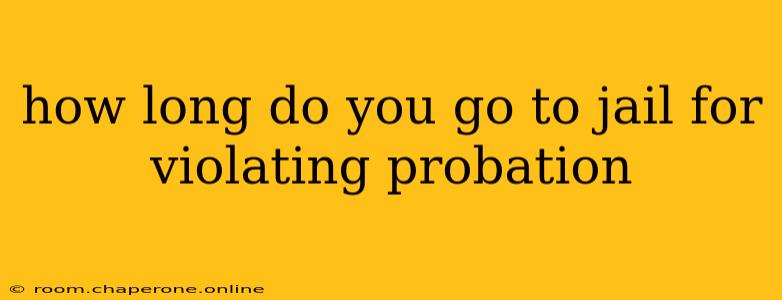Facing a probation violation can be a daunting experience, filled with uncertainty about potential consequences. The length of a jail sentence for violating probation isn't a simple answer; it varies greatly depending on several crucial factors. This comprehensive guide will delve into these factors, providing you with a clearer understanding of what you might face.
Factors Determining Jail Time for Probation Violation
The duration of incarceration for a probation violation depends on a complex interplay of circumstances. There's no single answer; it's highly individualized. Here are the key factors:
1. The Severity of the Original Offense:
The nature of the crime that initially led to probation significantly impacts the repercussions of a violation. A minor offense like shoplifting will likely carry less severe consequences than a violent felony. A more serious original crime usually leads to harsher penalties for violating probation.
2. The Nature of the Probation Violation:
Not all violations are created equal. Some are technical violations, meaning you breached a condition of your probation (e.g., missing a meeting with your probation officer, failing a drug test, or changing your address without permission) without committing a new crime. Others are substantive violations, involving the commission of a new offense. Substantive violations carry far more serious consequences, often resulting in significantly longer jail sentences.
3. Your Probation Officer's Recommendation:
Your probation officer plays a critical role in the process. They'll compile a report detailing your compliance (or lack thereof) with the conditions of your probation. Their assessment and recommendations carry significant weight with the judge. A positive report highlighting your efforts to comply can influence the outcome positively, while a negative report detailing multiple violations will likely lead to more severe consequences.
4. Your Criminal History:
A clean record will generally lead to more lenient treatment than a history of prior convictions. Judges consider your past behavior as an indicator of your likelihood to re-offend. A long history of criminal activity will significantly increase the chance of a longer jail sentence for a probation violation.
5. The Judge's Discretion:
Ultimately, the judge has the final say. They'll weigh all the factors mentioned above, along with any mitigating circumstances you might present, to determine the appropriate punishment. This makes it impossible to provide a definitive answer to the question of how long you might serve.
6. State and Local Laws:
Probation laws and sentencing guidelines vary significantly from state to state and even between counties within a state. What might be considered a minor violation in one jurisdiction could be a major offense in another.
Understanding Your Rights
If you're facing a probation violation, it's crucial to understand your rights. You have the right to legal representation and to present evidence in your defense. Consulting with an experienced criminal defense attorney is highly recommended. They can help you navigate the legal complexities, protect your rights, and advocate for the best possible outcome.
Consequences Beyond Jail Time
It's important to note that the consequences of a probation violation can extend beyond incarceration. You might face:
- Increased probation supervision: More frequent check-ins and stricter conditions.
- Mandatory drug or alcohol treatment: If substance abuse contributed to the violation.
- Fines or restitution: Financial penalties to compensate victims or cover court costs.
- Revocation of your driver's license: If driving was involved in the violation.
Conclusion
The length of jail time for violating probation is highly variable and depends on numerous factors. The severity of the original crime, the type of violation, your criminal history, and the judge's discretion all play a significant role. Seeking legal counsel immediately is the best course of action if you are facing a probation violation. An experienced attorney can explain your rights, assess your situation, and help you navigate the legal process to achieve the most favorable outcome possible. Remember, proactive legal representation is key to minimizing potential consequences.

